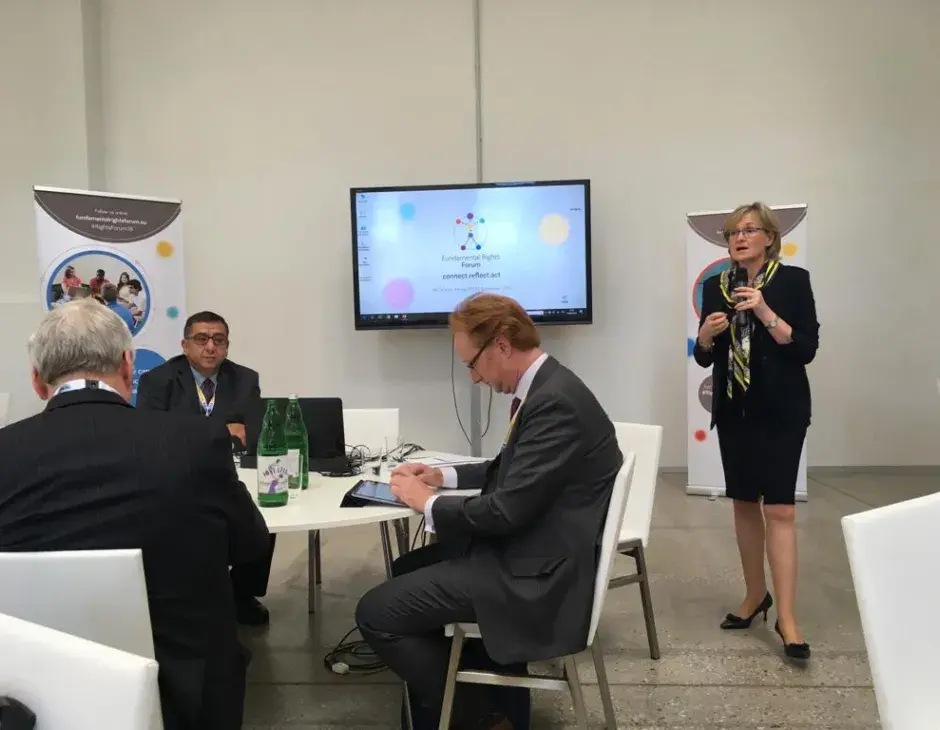The International Dialogue Centre (KAICIID) acted as co-contributor at the Fundamental Rights Forum, which welcomed policymakers and civil society leaders to discuss topics on inclusion, safety, and security.
The Vienna-based event, held September 25-27 by the European Union Fundamental Rights Agency, was not only supported by KAICIID, but also by the United Nations High Commissioner for Human Rights and the OSCE Office for Democratic Institutions and Human Rights.
KAICIID Senior Adviser, Professor Mohammed Abu-Nimer moderated a panel entitled “Shared Space of Religion and Human Rights in the Context of Improving Reception Conditions of Migrants,” at the conference, giving insights from the Centre’s work, including KAICIID’s Programme for the Social Inclusion of People Seeking Refuge in Europe (PSR).
“Secular institutions should feel comfortable reaching out to religious actors and organizations to ask for input and advice, particularly in common areas of concern such as successful integration” Abu-Nimer said. “This is also an area where KAICIID is uniquely positioned to help, by bridging policymakers with religious institutions in order to further common values through effective dialogue.”
PSR Programme Manager Naomi Hunt, who gave an introductory statement at the conference, noted that there is tremendous “shared space” across most religious and secular institutions when it comes to receiving people seeking refuge.
“Dignity and its counterparts, like respect or agency or individuality, are things that new migrants must have in order to be successful,” Hunt said. “These are core imperatives for religions and human rights, and are a shared space between the two. KAICIID’s mission is to help bridge these areas of understanding.”
“The work of the FRA shows that when secular institutions are open and inclusive in their policymaking, this fosters equal opportunities and a shared sense of belonging. There is great opportunity for faith-based organizations to partner with policymakers to build stronger, more cohesive communities.”
The following day, Vice President of the European Parliament Mairead McGuiness, chaired a session on the Shared Space of Religion and Human Rights in the Context of Improving Reception Conditions of Migrants. Ms McGuiness counts among her responsibilities the Implementation of Article 17 TFEU, the Treaty on the Functioning of the EU, which calls for open dialogue with religious and non-confessional organisations. In her address Ms McGuiness emphasised the role of European policy institutions, which is not to conduct or promote interreligious dialogue, but to recognise and amplify the role of faith communities and NGOs in European policy and European society.
Speaking of the role that religious communities play in providing a sense of community to those newly arrived in a country, she described how “when Irish people left for England, Australia, the United States they gathered around faith, sport, and other things that they knew. The role of faith is important for people of faith – but (places of worship) must not become place(s) of insulation where we don’t become involved in the wider community.”
She described the feelings of mutual distrust between people who adhere to a religious identity and those who do not, and the sense of exclusion that many religious communities feel from policymaking.
At a workshop following the session, participants discussed how this distrust could be overcome, and what concrete steps would help build bridges and ensure that all stakeholders, religious and non-religious, could cooperate in the promotion of human rights. Among others, they agreed on the need for increased awareness of the cooperation that already does exist in this field, and the need for dialogue to go beyond “safe” topics and participants, to include more conservative groups and voices, and address possibly contentious topics.

